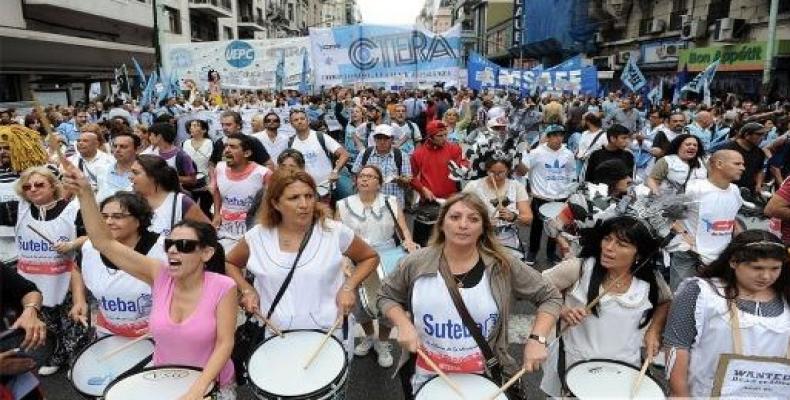Buenos Aires, August 26 (RHC)-- Classrooms were empty across Argentina Wednesday after teachers walked off the job to protest President Mauricio Macri’s neo-liberal education reforms and pressure his administration to resume negotiations with the teachers' union.
Several unions took part in the one-day strike, leaving some nine million students without school, Argentina’s La Nacion reported. The Confederation of Education Workers -- known by its Spanish acronym CTERA -- called the action, but other teacher unions quickly jumped on board amid brewing discontent over pay raises and the Macri administration's plans to deepen school privatization.
The government, however, has refused to reopen talks with teachers, and in response CTERA has announced a series of actions planned for the coming days and weeks to ramp up pressure on eduction officials. CTERA Secretary General Sonia Alesso said: "Conflicts will deepen if the debates taking place within a very complex context are not taking seriously.”
The unions in Argentina are demanding that government compensate teachers for lost wages, restructure salaries, and increase investment in public schools to 10 percent of GDP as a bulwark against privatization. They have also called for better training opportunities for teachers and tax breaks for education workers.
“The countries with better education are those that invest in the system, not privatize it,” added Alesso, saying that addressing social inequality is also part of the process of building a strong public education system.
Sergio Romero, head of the Union of Argentinean Teachers, or UDA, told Argentina’s Pagina 12 that the “overwhelming” national strike is clear proof of teachers’ growing discontent across the country and the “serious educational crisis” faced by teachers and students.
Education Minister Esteban Bullrich said Tuesday that renewed negotiations are “needless,” arguing that teachers' salaries and automatic increases are already sufficient. Union leaders argue that current pay increases do not take into account recent record levels of inflation.
The teachers are seeking compensation for lost wages in light of rising costs of basic services since Macri came to office in December. Unions have planned a national march on September 2 as well as another day of protest on September 21 to continue voicing their demands.
In his first weeks in office, Macri ruled by decree to transform the Ministry of Education, eliminate a mandatory high school law, and slash public spending on education by overturning a law that earmarked six percent of GDP for the education budget.


